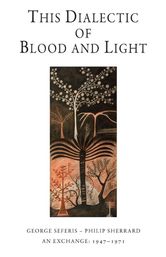
George Seferis & Philip Sherrard
This Dialectic of
Blood and Light
George Seferis –
Philip Sherrard
An Exchange : 1946–1971
Edited by Denise Sherrard
‘ . . . this dialectic of blood and light
which is the history of your people . . . ’
Sherrard to Seferis, 20 March 1950
Philip Sherrard first came across George Seferis's poetry when as a young man still in the army he was transferred to Greece in 1946. It made such a powerful impression on him that when he returned to England he started corresponding with Seferis, began translating his poetry into English, and ultimately decided to do his PhD on modern Greek poetry. Much later Sherrard was to translate, together with Edmund Keeley, Seferis's Collected Poems for Princeton University Press. The Seferis - Sherrard correspondence is not vast, but nevertheless revealing of both men's orientation, most particularly Sherrard's as he became increasingly interested in the Christian Orthodox East, and who simultaneously with his involvement in Greek literature and especially modern Greek poetry went on to write a number of important theological studies. Included with the correspondence are the texts that the two men sent to each other and three studies of Seferis's poetry written by Sherrard, the one published here for the first time. The book is introduced by the Emeritus Professor of Modern Greek at Oxford, Peter Mackridge, and the theologian Vincent Rossi, as well as by Sherrard himself in a text published here for the first time.
From ‘The Other Mind of Europe’, Philip Sherrard’s introductory essay to his correspondence with George Seferis:
‘I still remember my bewilderment when Seferis sent me a letter in which occur such phrases as: “I have a very organic feeling which identifies my human life with the life of nature”, and went on to speak of the Greek world — the world of Greek nature — as “lines which occur and recur; bodies and features, the tragic silence of a face . . . There is a process of humanization in the Greek light . . . Just think of those cords that bind man and the elements of nature together, this tragedy which is at once natural and human, this intimacy. Just think how the light of day and man’s blood are one and the same thing.”or when some passages from his diary were given to me, one of which read: “I know that all my life will not be sufficient to express what I have been trying to express for so long: this union of nature with the simple human body.” It is as if Seferis thought, not by discursive reasoning, but intuitively, in terms of natural objects, in terms of sensual images. It is as if the subject of his thought revealed itself to him not as an abstraction divorced from the rest of life, but in all its relationships not only to other ideas but to nature as well.’
The three essays by Seferis in this volume are on his long poem 'Thrush', the Monasteries of Cappadocia, and Delphi. Those by Sherrard, in addition to his three essays on Seferis's poetry, include his essays on Greece and the Classics, El Greco, and St Symeon the New Theologian.
‘The correspondence is fascinating, in itself, but especially to those who have already caught some facet of Philip's vision. It is supplemented by three introductory essays . . . which prepare the ground for the reader in an incomparable way. . . . it is beautifully produced, a joy to handle, a delight to read!’
Andrew Louth in Sobornost
- 416 pages, 23.5 x 15.5 cm, 2015